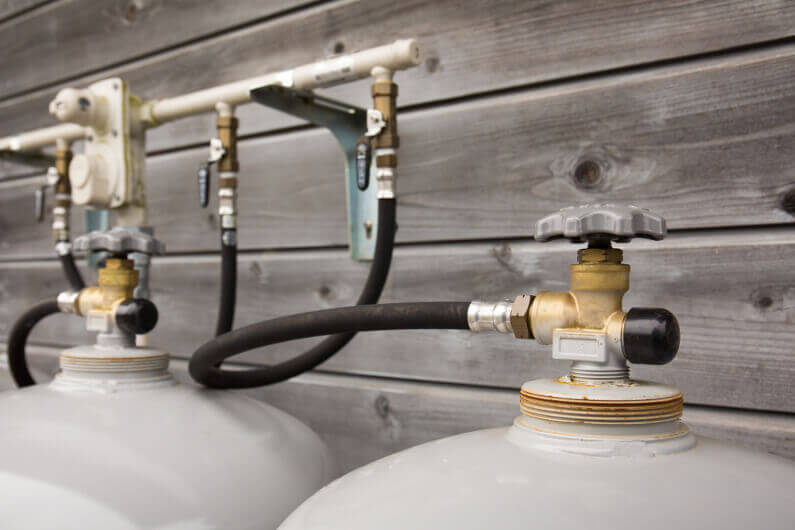A gas safety guide is crucial for every household. Why?
Every year, an average of 17 people die of gas leaks or related incidences in the United States, and hundreds hospitalized with injuries. The damages caused by the gas leak related explosions go beyond $50,000 per year.
Natural gas is an efficient power source used by many systems and appliances in our households. This gas, however, comes with its risks and can turn hazardous. If undetected and unrepaired, a natural gas leak can present serious health and safety hazards.
Although gas leaks are not that frequent, they can occur and catch you off guard. It’s then critical that every homeowner knows the risks and dangers of gas leaks and how to deal with them if they occur.
In this guide, we give a detailed account of the causes of gas leaks in our homes, how we can detect them, and what to do if they occur.
Gas Leaks Causes
Gas leaks can be caused by faulty, poorly fitted, and badly maintained appliances like cookers and boilers. Badly fitted appliances allow gas to escape from either the gas hose that carries gas to your appliances or from the area around the seal.
It’s always wise and safe that the homeowner contracts an accredited and registered gas safe engineer to avoid this. It’s also safe to consult a registered gas safe engineer when servicing home appliances at home.
Caution must be taken when installing second hand or older appliances because they may be faulty and are more susceptible to gas leaks than new appliances.
Gas Leak Signs
There are several warning signs that your gas is leaking. They include hissing sounds, the smell of rotten eggs, dead or dying plants, higher than normal gas usage, physical symptoms of gas poisoning, and air bubbling outside your home.
When there is a large gas leak, the pipes or appliance leaking may produce a hissing sound even when they are turned off. It’s therefore critical that homeowners be wary of hissing sounds in their homes.
Natural gas, in its natural form, is both colorless and odorless. Gas companies add odorants that smell like rotten eggs or sulfur to the gas to make it more detectable. There is a high probability of a gas leak when there is sulfur or the rotting egg smell.
Exposure to low natural gas inhalation levels has symptoms such as fatigue, headaches, dizziness, and irregular breathing. Exposure to high levels of natural gas leak leads to natural gas poisoning.
If a homeowner experiences the above symptoms, they should get out of the house immediately. If the symptoms subside after breathing fresh air, there is a gas leak in the home.
When the plants inside and outside your house are well-taken care of and are either stunted, dying, or dead, it should be a sign that there is a gas leak in that home. Natural gas exposed to plants inhibits their oxygen intake, which leads to wilting.
Preventing Gas Leaks
Home appliances are the most likely reason for most of the gas leaks in the house. Electric generators, water heaters, furnaces, stoves, and electric cloth dryers are common gas-powered appliances used in our homes. The appliances have a pilot light that indicates the kind of flame that should burn in them, and anything different is a warning sign that something is wrong.
The best and easiest way to prevent gas leaks is to prevent it from occurring in the first place. The best way to do so is to ensure that an accredited natural gas engineer installs all house appliances. The appliances must also be inspected regularly for wear and tear.
The human nose may not detect low-level gas leaks and sometimes even high-level gas leaks. To avoid gas poisoning, the homeowner should install an audible natural and carbon monoxide detector alarm that looks like smoke detectors in hallways and other open spaces in the house.
Keeping small children away from potential exposures sources of natural gas is vital because children may unknowingly mess with appliances and cause gas leaks that will be detrimental to them and those residing in that home.
What You Should Do in Case of a Gas Leak
Immediately you smell gas in your home; you should take the following actions. First, put off the gas supply at the valve connected to your pipe at a right angle. Sometimes this valve is hard to access, but it needs to be turned off. Most properties also have a gas shutoff valve outside the house.
The second step is to open all the doors and windows and leave it that way so that there is a free flow of fresh air. This will help dispense the gas. If the gas is too much, get outside the house and get fresh air as soon as you can.
As you air your house, avoid using electrical switches like doorbells and light switches as they can spark the gas into an explosion. Also, avoid burning naked flames, smoking, or using matches anywhere near the house.
Once outside and away from the house, call the national gas emergency number. This is because there is a very slight possibility that the phone call can spark a fire. In case of a fire, call the fire department.
What Not to Do in Case of a Gas Leak
In the case of a gas leak, do not stay indoors, don’t look for the source of the leak, or try to repair it. This is because you will get exposed to the gas and maybe poisoned. Also, do not fail to report the situation as the house will need a thorough inspection of the gas line and sealing by a professional.
Can We Be Safe From Gas Leaks?
Everyone deserves to be secure, safe, and warm inside their homes. Going through the guide will help you be aware of the risks and know how to address them if and when need be.
Are you in need of plumbing services in your home? Plumbing Time is your go-to plumbing service provider in Columbia, SC. Contact us today to schedule a service.










